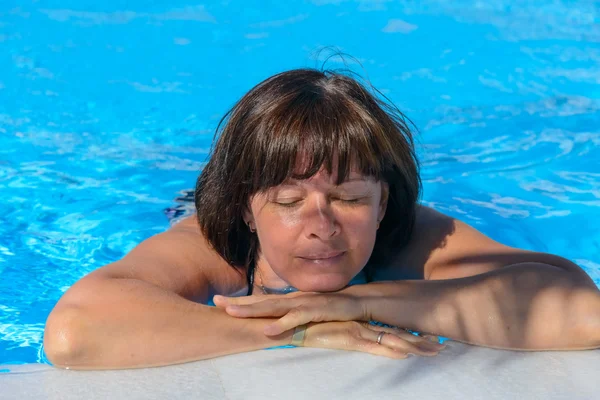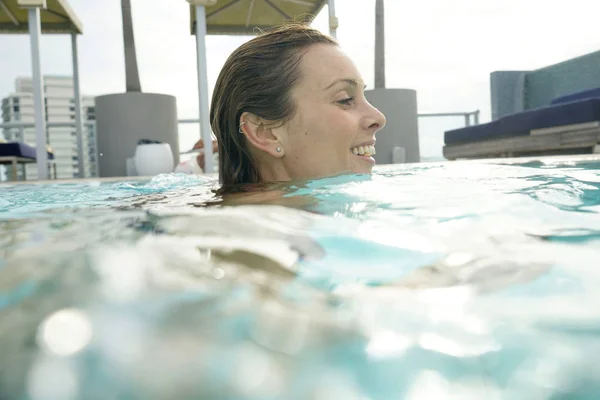Get to know how “Cold Water Swimming: A Refreshing Dip Against Menopause’s Heat?” Menopause, a natural transition marking the end of a woman’s reproductive years, can be accompanied by a wave of unwelcome symptoms. From the fiery discomfort of hot flashes to the emotional rollercoaster of anxiety and mood swings, these changes can significantly impact quality of life. While established treatments like hormone therapy exist, many women seek complementary approaches to manage these challenges. Enter cold water swimming, a practice emerging from the chilly depths as a potential ally in navigating the menopausal journey.
A recent study published in Sage Journals, involving over 1,100 women, has shed light on the intriguing link between cold water immersion and symptom relief. Among the participants, 785 were experiencing menopause, and their experiences paint a promising picture. Nearly half (46.9%) reported a reduction in anxiety, a common foe during menopause, while 34.5% found their mood swings easing. These improvements weren’t just emotional; 31.1% described a lift in low mood, and 30.3% experienced fewer hot flashes, the signature scorchers of menopause.

But how does a dip in chilly waters translate to such benefits? The study suggests several mechanisms at play. The initial gasp reflex triggered by cold water exposure activates the parasympathetic nervous system, promoting relaxation and counteracting the fight-or-flight response that fuels anxiety. Additionally, the release of endorphins, the body’s natural painkillers and mood boosters, might contribute to the observed improvements in pain management and overall well-being.
Cold Water Swimming: A Refreshing Dip Against Menopause’s Heat?
Beyond symptom relief, cold water swimming seems to offer a broader spectrum of advantages. Participants reported increased energy levels, improved sleep quality, and a heightened sense of vitality. This holistic approach to well-being aligns with the growing recognition of the mind-body connection in managing menopausal symptoms. Furthermore, the social aspect of cold water swimming groups can foster a sense of community and support, further contributing to positive mental health outcomes.
“Cold water has previously been found to improve mood and reduce stress in outdoor swimmers, and ice baths have long been used to aid athletes’ muscle repair and recovery,” Joyce Harper, a professor of reproductive science at University College London and a senior author of the study, said in a press release.
However, it’s crucial to remember that cold water swimming isn’t a one-size-fits-all solution. Before taking the plunge, consulting a healthcare professional is essential, especially for women with pre-existing health conditions like heart disease or high blood pressure. Gradual acclimatization, starting with brief dips and progressively increasing duration and water temperature, is key to ensure a safe and enjoyable experience. Choosing well-supervised locations with easy access and potential assistance like a buddy system is also paramount.
While further research is needed to fully understand the long-term effects and optimal protocols for cold water swimming in menopause management, the initial findings are encouraging. For women seeking alternative or complementary approaches to navigate this life stage, a dip in the cool water might offer a refreshing reprieve from the heat of menopausal symptoms.
Diving into the Deep End: The Study’s Findings
The study participants, who regularly engaged in cold water swimming (defined as swimming in open water below 15°C or 59°F), reported experiencing notable improvements in various areas. Here’s a closer look at the key findings:
-
Stress and Anxiety: Nearly half (46.9%) of the participants reported a reduction in anxiety symptoms after cold water swimming. This aligns with existing research suggesting that cold water exposure can trigger the release of endorphins, the body’s natural mood-boosters, and activate the parasympathetic nervous system, promoting relaxation and stress reduction.
-
Hot Flashes and Night Sweats: Approximately 30% of the participants experienced a decrease in the frequency and intensity of hot flashes, a notoriously disruptive symptom for many women in menopause. The study suggests that the cold water’s initial shock triggers a “cold shock response,” causing the body to constrict blood vessels, potentially reducing the vasomotor instability associated with hot flashes.
-
Sleep Quality and Pain Management: Over a third (34.5%) of the participants reported improved sleep quality, likely due to the calming effect of cold water immersion and the release of sleep-promoting hormones. Additionally, 31.1% reported a reduction in aches and pains, potentially benefiting from the cold water’s anti-inflammatory properties.
Beyond Symptom Relief: A Holistic Approach to Well-being
The benefits of cold water swimming extend beyond symptom relief. Participants reported experiencing improved mood, increased energy levels, and a greater sense of well-being. This holistic approach to health aligns with the growing recognition of the mind-body connection and the importance of addressing both physical and emotional aspects of well-being during menopause.
More than 60% of the women in the study swam to relieve their symptoms. Most of them swam in summer and winter. They wore bathing suits, not wetsuits.
In addition to relieving symptoms, the women said they felt cold water swimming improved mental health, increased regular exercise, and gave them time outdoors. The women also felt the positive effects were more pronounced when it was colder.
The researchers also explored whether cold water swimming helped menstrual symptoms. They found:
- 46% said it improved anxiety.
- 37% said it helped mood swings.
- 37% said it improved irritability.
Furthermore, the social and community aspect of cold water swimming groups cannot be overlooked. Participating in such groups can foster a sense of belonging, support, and shared experience, which can be particularly valuable for women navigating the challenges of menopause.
Navigating the Currents: Safety Considerations
While the findings of the study are encouraging, it’s crucial to approach cold water swimming with caution and prioritize safety. It’s essential to consult a doctor before starting, especially if you have any pre-existing health conditions like heart disease, asthma, or epilepsy.
Here are some key safety tips for cold water enthusiasts:
- Gradual Acclimatization: Start with brief immersions and gradually increase the duration and frequency over time to allow your body to adapt.
- Buddy System: Never swim alone, especially in open water. Always have a buddy or group present for safety and support.
- Choose Safe Locations: Swim in areas with lifeguards or easy access to help in case of emergencies.
- Listen to Your Body: Pay attention to your body’s signals and avoid pushing yourself too hard. Exit the water immediately if you experience any discomfort.
Conclusion: A Promising Plunge into Menopause Management
The research on cold water swimming as a potential tool for managing menopause symptoms is still in its early stages, and further studies are needed to confirm these findings and elucidate the underlying mechanisms. However, the current study offers a compelling glimpse into the potential benefits of this unconventional approach.
For women seeking alternative or complementary therapies to manage their menopausal symptoms, cold water swimming presents a promising option. While not a magic bullet, it may offer significant relief from stress, hot flashes, sleep disturbances, and aches and pains, while also contributing to overall well-being and quality of life.
Of course, safety remains paramount. Consulting a doctor, following safety guidelines, and starting slowly are essential steps for anyone considering taking the plunge into this potentially transformative practice. As more research emerges, cold water swimming may become a valuable addition to the toolbox for women navigating the often-challenging waters of menopause.
Read Also | How Probiotics and Prebiotics in Fermented Foods Impact Mental Health
Note: This article is written based on scientific evidence found by the 247newsaroundtheworld.com team. Sources are duly referenced with keywords hyperlinked to source websites and are clickable for reference.






